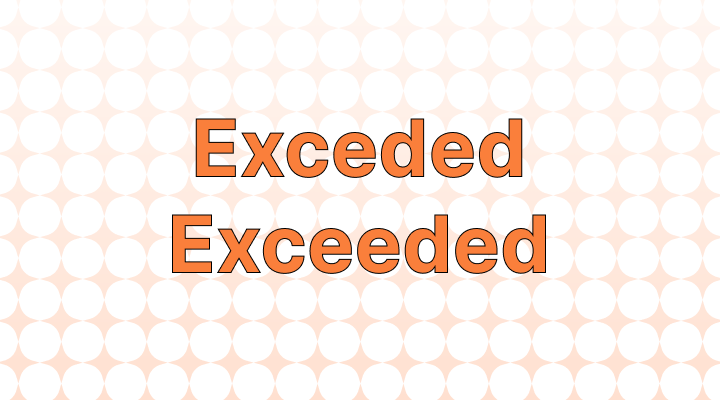- "Exceded" is an incorrect spelling of the word "exceeded."
- "Exceeded" is the past tense of a verb that means to surpass or go beyond a specified limit, quantity, or degree.
❌ She exceded all expectations in her performance, showcasing exceptional skills and dedication.
✅ She exceeded all expectations in her performance, showcasing exceptional skills and dedication.
In this context, "exceeded" means to surpass or go beyond the set expectations or standards.
What does "exceeded" mean?
Within the realm of quantitative analysis and comparison, "exceeded" denotes the act of surpassing or going beyond a predetermined limit, boundary, or expectation. This term finds application in various contexts, signifying a deviation from established benchmarks or thresholds.
Key Characteristics:
- Quantifiable comparison: "Exceeded" implies a measurable value or quantity that has surpassed a defined reference point. This point could be a numerical target, a set standard, or an anticipated outcome.
- Magnitude of difference: The extent to which "exceeded" applies can vary. It can signify a slight overstepping of a limit, a significant deviation, or even a complete obliteration of the expected value.
- Positive or negative connotations: Depending on the context, "exceeded" can carry either positive or negative connotations. Surpassing a sales target may be desirable, while exceeding a speed limit carries negative consequences.

The use of "exceded" and "exceeded" over time
The Ngram graph below shows how often "exceded" and "exceeded" have been used from the 1800s to the 2000s. "Exceeded" has seen relative steady use until dipping sharply from the 1980s, while its misspelling "exceded" has seen nearly zero use.

How to pronounce "exceeded"
In both British and American English, "exceeded" is pronounced like "uhk·see·duhd".
This is just the standard pronunciation, and there may be slight variations depending on regional accents and individual speech patterns.
Why would we misspell "exceeded" as "exceded"?
- Typo: "Exceded" is essentially "exceeded" with a missing "e," which someone could accidentally omit while typing quickly or not paying close attention to the spelling.
- Phonetic influence: The pronunciation of "exceeded" might lead some to think it follows a pattern similar to words like "ceded" or "preceded," where the "e" comes before the "c." This phonetic association could lead to the incorrect spelling "exceded."
Other common misspellings of "exceeded"
- exceed
- exeeded
- exceded
- exeed
- exced
Example sentences of the misspelling of "exceeded" as "exceded"
- "Exceded" is not a recognized spelling; the correct term is "exceeded."
- If you find "exceded" in your document, it's a misspelling; use "exceeded" instead.
- Avoid the common mistake of writing "exceded" when you mean to say "exceeded."
- There's no such word as "exceded" in standard English; the correct form is "exceeded."
- Double-check your work to ensure you haven't inadvertently used "exceded" instead of the correct spelling, "exceeded."
Example sentences of "exceeded"
- The company's profits exceeded expectations this quarter.
- Mary's academic performance exceeded the teacher's predictions.
- The speed of the car exceeded the posted limit.
- The team's dedication exceeded all previous records.
- The success of the fundraising campaign exceeded everyone's wildest dreams.
- The movie's box office earnings exceeded those of its competitors.
- The athlete's performance exceeded the standards set by the coach.
- The project's completion time exceeded the initial estimate.
- The novel's popularity exceeded the author's expectations.
- The laughter in the room exceeded the volume of the music.
🖊️ Occured or Occurred: Which Is Correct?
🖊️ Purposely vs. Purposefully
Synonyms for "exceeded"
- Surpassed
- Outstripped
- Transcended
- Overshot
- Excelled

Want to sound like a native speaker?
Engram’s AI-powered grammar checker makes your English sound like a native speaker’s, suggesting natural English expressions on top of fixing grammar, spelling, punctuation, word order, and vocabulary.

References:














